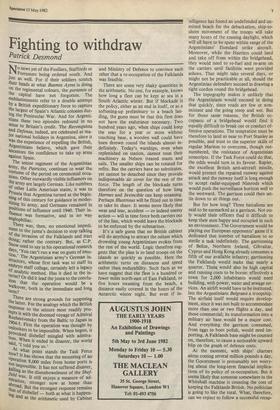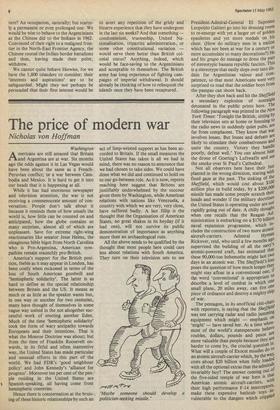Fighting to withdraw
Patrick Desmond
No news yet of the Fusiliers, Staffords or Forresters being ordered south. And Just as well. For if their soldiers scratch their heads at what Buenos Ayres is doing on the regimental colours, the portenos of the capital have not forgotten. The emblazonments refer to a double attempt by a British expeditionary force to capture the largest of Spain's Atlantic colonies dur- ing the Peninsular War. And for Argenti- nians these two episodes redound in no sense to Britain's credit. The Reconquista and Defensa, indeed, are celebrated as ma- jor national holidays in Argentina, since it was the experience of expelling the British, Argentinians believe, which gave their ancestors the confidence to take up arms against Spain. The senior regiment of the Argentinian army, the Patricios, continues to wear the costume of the period on ceremonial occa- sions. Other outwardly visible influences on the army are largely German. Like numbers of other Latin American states, it was to Prussia that Argentina turned at the begin- ning of this century for guidance in moder- nising its army, and Germans remained in in-
fluence of influence until 1940. Their n-
fluence was formative, and in no way anglophiliac. There was, then, no emotional impedi- ment to the junta's decision to stop talking of the invasion of the Falklands and start doing; rather the contrary. But, as C.F. Snow used to say in his operational research days, `You can't run a war on gusts of emo- tion., The Argentinian army's German in- structors, whose first task was to staff its embryo staff college, certainly left a legacy of .analytic method. Has it died in the in tenor? Or did it lead the junta to the conclu- sion that the operation would be a walkover, both in the immediate and long term?
There are strong grounds for supposing the latter. For the analogy which the British response to the seizure most readily pro- mpts is with the doomed voyage of Admiral R. ozhestvensky from the Baltic to Japan in 19°4-5. First the operation was thought by onlookers to be impossible. When begun, it Provoked disbelief mingled with admira- tion. When it ended in disaster, the world said, 'I told you so.' At what point stands the Task Force now? It has shown that the mounting of an °Aeration 8,000 miles from home ports is
not 1 mPossible. It has not suffered disaster,
6.a. ning as the disembowelment of the Shef- field was. It still enjoys a measure of ad- miration, stronger now at home than abroad. But the strongest response remains that of disbelief — both at what is happen- ing and at the arithmetic used by Cabinet
and Ministry of Defence to convince each other that a re-occupation of the Falklands was feasible.
There are some very shaky quantities in the arithmetic. No one, for example, knows how long a fleet can be kept at sea in a South Atlantic winter. But if blockade is the policy, either as an end in itself, or as a softening-up preliminary to a beach lan- ding, the guess must be that this fleet does not have the endurance necessary. Two hundred years ago, when ships could keep the seas for a year or more without touching base, a wooden wall could have been thrown round the islands almost in- definitely. Today's warships, even when replenished on station, cannot treat their machinery as Nelson treated masts and sails. The smaller ships can be rotated for refits. But the carriers have no substitutes, yet cannot be detached since they provide indispensable air cover for the rest of the force. The length of the blockade turns therefore on the question of how long Hermes and Invincible can keep steaming. Perhaps Illustrious will be fitted out in time to take its share. It seems more likely that wear and tear, accident — or indeed enemy action — will in time force both carriers out of the line, which would leave the blockade to be enforced by the submarines.
It's a safe guess that no British cabinet will do anything to attract the odium which drowning young Argentinians evokes from the rest of the world. Logic therefore sug- gests that the plan is to land troops on the islands as quickly as possible. Here the arithmetic turns on distances and speed rather than endurability. Such facts as we have suggest that the fleet is a hundred or fewer miles north-east of East Falkland, or five hours steaming from the beach, a distance easily covered in the hours of the Antarctic winter night. But even if in- telligence has found an undefended and un- mined beach for the debarkation, ship-to- shore movement of the troops will take many hours of the ensuing daylight, which will all have to be spent within range of the Argentinians' Etendard strike aircraft. Moreover, while the Harriers could land and take off from within the bridgehead, they would need to re-fuel and re-arm on the carriers until facilities were provided ashore. That might take several days, or might not be practicable at all, should the Argentinian defenders succeed in drawing a tight cordon round the bridgehead.
The topography makes it unlikely that the Argentinians would succeed in doing that quickly, since roads are few or non- existent and the going steep and wet. But for those same reasons, the British oc- cupants of a bridgehead would find it equally difficult to break out or conduct of- fensive operations. The temptation must be therefore to land as near to Port Stanley as possible, and trust to the superior skills of regular Marines to overcome, though out- numbered, the resistance of Argentinian conscripts. If the Task Force could do that, the odds would turn in its favour. Rapier, the excellent British anti-aircraft missile, would protect the repaired runway against attack and the runway itself is long enough to accept radar-equipped Nimrods which would push the surveillance horizon well to the westward. The garrison could then set- tle down to sit things out.
But for how long? Three battalions are said to be earmarked as a garrison. Not on- ly would their officers find it difficult to keep their men happy and occupied in such an environment. The Government would be playing our European opponents' game if it dedicated that number of battalions to so sterile a task indefinitely. The garrisoning of Belize, Northern Ireland, Gibraltar, Cyprus and Hong Kong already consumes a fifth of our available infantry; garrisoning the Falklands would make that nearly a quarter. Thei,e would also be high capital and running costs to be borne: effectively a town for 2,000 inhabitants would need building, with power, water and sewage ser- vices. An airlift would have to be instituted, lest the Argentinians Belgrano a troopship. The airfield itself would require develop- ment, since it was not built to accommodate more than one or two flights a day, and those commercial; its transformation into a military air base would be a major cost. And everything the garrison consumed, from eggs to boot polish, would need im- porting. A Falklands base might be counted on, therefore, to cause a noticeable upward blip on the graph of defence costs.
At the moment, with ships' charters alone costing several million pounds a day, the Government is presumably not worry- ing about the long-term financial implica- tions of its policy of re-occupation. But it seems likely that someone somewhere in the Whitehall machine is counting the cost of keeping the Falklands British. No politician is going to like the total. What, therefore, can we expect to follow a successful recap- ture? An occupation, naturally; but scarce- ly a permanent or even prolonged one. We would be wise to behave to the Argentinians as the Chinese did to the Indians in 1962. Convinced of their right to a realigned fron- tier in the North-East Frontier Agency, the Chinese routed the Indian border battalions and then, having made their point, withdrew.
We cannot quite behave likewise, for we have the 1,800 islanders to consider; their `interests and aspirations' are to be safeguarded. Might they not perhaps be persuaded that their first interest would be to avert any repetition of the grisly and bizarre experience that they have undergone in the last six weeks? And that something condominium, trusteeship, United Na- tionalisation, tripartite administration, or some other constitutional variation would serve them better than British col- onial status? Anything, indeed, which would be face-saving to the Argentinians and acceptable to themselves. The British army has long experience of fighting cam- paigns of imperial withdrawal. It should already be thinking of how to relinquish the islands once they have been recaptured.







































 Previous page
Previous page